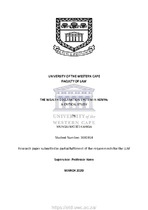The wealth declaration system in Kenya: a Critical study
Abstract
The culture of corruption is rooted deeply in Kenya. It may be described as an incurable infectious disease.1 Kenya has been ranked as one of the most corrupt countries in the world. For the last three years, Kenya has scored less than 27 percent in the Corruption Perceptions Index published by Transparency International. Corruption persists mainly because those in public office benefit from it and the existing institutions lack both the will and capacity to stop it. It persists despite the legislation, institutions and measures that have been put in place to fight it.3 The Ethics and Anti-Corruption Commission is the main institution mandated to combat corruption in Kenya. The primary anti-corruption laws are the Public Officer Ethics Act No 4 of 2003, the Leadership and Integrity Act No 18 of 2014, the Public Officer Ethics (Management, Verification and Access to Financial Declaration) Regulations of 2011 and the Kenyan Constitution of 2010. One of the key anti-corruption measures is the system of wealth declarations by public officials established by the Public Officer Ethics Act (POEA). The POEA did not have an easy passage into law. When it was introduced in 2002, Kenya was governed by the Kenya African National Union (KANU), led by President Moi. The regime was characterised by autocratic rule, high levels of politically sanctioned corruption, rapid economic decline and massive accumulation of wealth for the politically connected.4 Unsurprisingly, President Moi did not assent to the enactment of the POEA. The National Rainbow Coalition (NARC) came into power in 2003 and re-commenced the process to pass the POEA into law. This was done with a view to curbing corruption and bolstering donor confidence.5 Regrettably, the NARC administration quickly replicated the corrupt practices of its predecessor, despite being elected on a platform of zero tolerance towards corruption. The new administration, which had promised war on corruption, instead was embracing corruption and denying citizens constitutional reforms.

